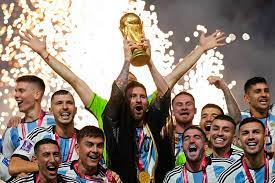January 13 – After Argentina won the World Cup for the second time in 1986, Diego Maradona was the king of football in Argentina. He was seen as a god in his country, given how well he delivered for the team. His successor, Lionel Messi was not born until June 24.
Messi showed signs that he had the talent to become a professional player from an early age. With his move to Barcelona, he became a worldwide sensation as he immediately impacted the club and was promoted to the first team and the top picks for punters who participated in sports betting online when he was still a teenager.
In 2005, Messi won his first of four UEFA Champions League trophies. The following year, he was called up to the Argentinian first team, beginning that journey to becoming a world champion 17 years later. Between 2005 and 2010, he was still a young prospect, even so the weight and expectation of the country was starting to build.
Between those years, Messi won one Balon d’Or following his heroics in the 2009 UEFA Champions League match against Manchester United. He also won the Olympic Gold and Under 20 FIFA World Cup trophies. He made a name as a huge prospect leading up to the 2010 FIFA World Cup.
He has since won six Balon d’or trophies and one FIFA Best award and looks nailed on for the 2022 FIFA Best player award from the shortlist just announced.
2010 – Quarter final Shameful Loss
In 2010, hopes were high for the little magician to lead his country to glory in South Africa with Diego Maradona as the coach. It was the perfect scene for an Argentinian victory and it looked promising when the competition started. Argentina were in blazing form, thanks to their incredible attacking football.
The team won all their group games, scoring seven and only conceding one. It looked perfect. In the knockout phase, they beat Mexico in the round of 16 but the road ended when they met Germany. Their attacking football tactics backfired, and the team lost 4-0 to the Germans.
2014 – Close, yet so far
The story was different in 2014. Messi was older and had grown to become a leader in the team. The team relied heavily on Messi to create magic, which worked for most of the competition. Like in 2010, Argentina won all their group games. But this time, they conceded three goals and scored six.
However, they were more organised, with the backline ready to handle any attack. They won their round of 16 match 1-0, and after that defeated Belgium in the quarterfinals 1-0.
However, they couldn’t get that goal in the semi-final and had to settle for a penalty shootout, which they won 4-2. Finally, Messi was in the World Cup final, but it was not meant to be this time as Germany scored a late goal to seal the victory.
2018 – Round of 16 Defeat
The team returned to the World Cup with a different and older Messi leading the team after he retired from the national team following multiple final losses in major competitions. In 2018, the team didn’t look strong enough to handle the pressures of the World Cup, and they barely made it out of their Group and couldn’t get past France in the round of 16.
Undoubtedly, 2018 wasn’t a good look for the team and with Messi turning 35 by the time the tournament returned it looked like 2022 would be his last shot at winning the World Cup. The team began a dramatic four-year rejuvenation, which saw them win the 2021 COPA America.
2022 – Ultimate Champion
Before the 2022 FIFA World Cup, many people touted a final between Portugal and Argentina so that the two top players of the last decade (Ronaldo vs Messi) could get a shot at the most coveted trophy of all. It couldn’t have started worse for Argentina, with the team losing to Saudi Arabia.
But this was a different to previous years, and this time, they were ready. They worked hard to win their last two group matches. In the round of 16, they won against Australia, then went on to face the Netherlands, and like in 2014; they won on penalties. In the semi-final, they swept a well organised Croatia aside.
In the final, they had to face France, the team that knocked them out in 2018, and this time they did the job. It was an epic match that saw Kylian Mbappe solidify his status as the future of soccer with a hat trick.
But it was Messi who become World Champion.
Contact the writer of this story at moc.l1743731030labto1743731030ofdlr1743731030owedi1743731030sni@o1743731030fni1743731030

